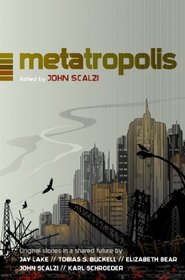Helpful Score: 1
This is a collection of short stories in a collaborative cities of the future setting. Initially produced as an audiobook, the collection did eventually find print.
This future is an odd one; the basic idea seems to be the collapse of early 21st century political systems, and the re-emergence of the city-state. Only, rather than doing that with medieval technology, the cities are equipped with 22nd century technology. The collection as a whole was interesting, but few of the stories really grabbed me.
Quick reviews by story:
In the Forests of the Night by Jay Lake: The story of a militant, hide-in-the-woods collective in the Cascades, and a pair of different strangers who come to visit. This was a flavor piece, mostly. Mildly interesting.
Stochasti-City by Tobias S. Buckell: The marginally employed in this world have it rough. This story starts about turking, which is the taking of small, minor tasks for employment durations of hours or at most days. Jobs which anyone can fulfill. (E.g.: Stand on this corner and text this number when someone in a white van drives by.) Then we get the application of that technology and its use in organized crime, and from there to renegade engineering. We also get the private police force that cities hire (Edgewater), and how that interaction goes. This story was quite good.
The Red in the Sky is our Blood by Elizabeth Bear: A more personal story of running (or rather, having run) in a world so odd as this one. Im still not sure what the point of this story is, but I enjoyed it. I think perhaps its to show that not all is static, and that the populations there do take action to find better ways to live.
Utere Nihil Non Extra Quiritationem Suis by John Scalzi: Scalzi has interpersonal dialog down in a way that makes exchanges extremely fun to read, even when theyre not deep. This story thrums with that sort of exchange. And its a big shift from the other stories (which all seem much more intellectual). This one is about how the people who work within the system handle the shift from childhood to useful adulthood. And also about the people who find that system toxic. I really liked this one, too.
To Hie from Far Cilenia by Karl Schroeder: The final story takes a break from physical reality and dives into virtual reality, as a private investigator type goes in search of a missing person (in a missing reality). It was strange, and reasonably good.
So my favorite was Scalzis, though his story felt more shallow. The kind of world described here is not what II hope to cede to my children, but the ideas here are definitely interesting, and I wouldnt be surprised to find them (some of them, anyway, without the same disadvantages) happening somewhere in the world in the next century.
4 of 5 stars.
This future is an odd one; the basic idea seems to be the collapse of early 21st century political systems, and the re-emergence of the city-state. Only, rather than doing that with medieval technology, the cities are equipped with 22nd century technology. The collection as a whole was interesting, but few of the stories really grabbed me.
Quick reviews by story:
In the Forests of the Night by Jay Lake: The story of a militant, hide-in-the-woods collective in the Cascades, and a pair of different strangers who come to visit. This was a flavor piece, mostly. Mildly interesting.
Stochasti-City by Tobias S. Buckell: The marginally employed in this world have it rough. This story starts about turking, which is the taking of small, minor tasks for employment durations of hours or at most days. Jobs which anyone can fulfill. (E.g.: Stand on this corner and text this number when someone in a white van drives by.) Then we get the application of that technology and its use in organized crime, and from there to renegade engineering. We also get the private police force that cities hire (Edgewater), and how that interaction goes. This story was quite good.
The Red in the Sky is our Blood by Elizabeth Bear: A more personal story of running (or rather, having run) in a world so odd as this one. Im still not sure what the point of this story is, but I enjoyed it. I think perhaps its to show that not all is static, and that the populations there do take action to find better ways to live.
Utere Nihil Non Extra Quiritationem Suis by John Scalzi: Scalzi has interpersonal dialog down in a way that makes exchanges extremely fun to read, even when theyre not deep. This story thrums with that sort of exchange. And its a big shift from the other stories (which all seem much more intellectual). This one is about how the people who work within the system handle the shift from childhood to useful adulthood. And also about the people who find that system toxic. I really liked this one, too.
To Hie from Far Cilenia by Karl Schroeder: The final story takes a break from physical reality and dives into virtual reality, as a private investigator type goes in search of a missing person (in a missing reality). It was strange, and reasonably good.
So my favorite was Scalzis, though his story felt more shallow. The kind of world described here is not what II hope to cede to my children, but the ideas here are definitely interesting, and I wouldnt be surprised to find them (some of them, anyway, without the same disadvantages) happening somewhere in the world in the next century.
4 of 5 stars.




![header=[] body=[Get a free book credit right now by joining the club and listing 5 books you have and are willing to share with other members!] Help icon](/images/question.gif?v=e658102d)
